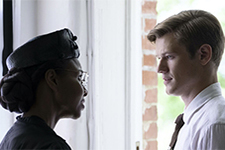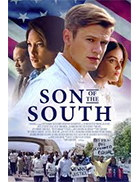Son of the South
|  Son of the South is an earnest, well-produced docudrama about how Bob Zellner (Lucas Till), a white college student in Alabama during the turbulent early ’60s, had his consciousness raised by his direct experience with the civil rights movement. The son of an itinerate Methodist minister and former Klansman (Byron Herlong) and grandson of a virulent and unrepentant Klansman (Brian Dennehy), Bob was living an uncomplicate life of white privilege in the Deep South when he and some fellow students at Huntingdon College in Montgomery decided to research race relations for a class assignment. The very notion of researching such a topic was anathema to the professors and most of the students at the small, conservative Christian college, but Bob forged ahead anyway, which eventually brought him into contact with several seminal figures in the Civil Rights Movement, including Rosa Parks (Sharonne Lainer), who is depicted as wily, shrewd, and very purposeful in her endeavors; John Lewis (Dexter Darden), the future Congressman who at the time was a determined Freedom Rider; and Rev. Ralph Abernathy (Cedric the Entertainer), senior pastor of Montgomery’s First Baptist Church and a friend of MLK’s who helped organize the Montgomery Bus Boycott in 1955. One of Bob’s biggest “sins”—and the event that truly forces him to recognize the absurdity and dangers of institutionalized racism—is his attending one of Rev. Abernathy’s church services, where the color of the skin of the men and women around him was apparently more important to the white community than their status as fellow Christians. While the other Huntingdon students give in to the pressures to step away from the civil rights movement, Bob finds himself being drawn more and more to it, eventually at the cost of his less-than-tolerant fiancée, Carol Anne (Lucy Hale), who isn’t willing to sacrifice their privileged future to fight for the rights of others. He has his father’s support, but finds himself in constant conflict with his grandfather, who at one point shows up outside Huntington in full Klan garb with a group of two dozen other men. Later he meets with him on a park bench and tells him in no uncertain terms that he would put a bullet in his head if he ever saw him at a civil rights march. Bob gains new friends, though, notably Virginia Durr (Julia Ormond), a wealthy white civil rights activist, and Joanne (Lex Scott Davis), an African-American student-activist with whom he begins a romantic relationship (David plays the role with conviction, but Joanne is the closest thing the film has to a romanticized cliché of a character). As Bob moves deeper into the civil rights movement, he forgoes law school to work with the Student Nonviolent Coordinating Committee (SNCC), which mostly requires him to sit in an otherwise empty office in Atlanta and answer the telephone. While Bob witnesses plenty of familiar action associated with the civil rights movement, notably the violent response of local authorities to the Freedom Riders, who are beaten viciously, this depiction of the more mundane aspects of maintaining any coordinated, organized, national movement is both fascinating and necessary (not to mention, at times, humorous). Part of Bob’s consciousness raising—his willful embrace of being a so-called “race traitor”—is not just his recognition of the depths of racism in his country and the toll it takes on innocent lives, but a reimagining of his own place in the world. As a white Southerner (the title’s “son of the South,” which is surely intended as a riff on Disney’s long suppressed Song of the South), Bob has grown up entitled and privileged, not having to worry about the difficulties faced by the African Americans in his community. His becoming an active part of the civil rights movement opens his eyes, but also humbles his ego, as he sees people like Rosa Parks and John Lewis literally risking life and limb to achieve some semblance of justice and recognition of their humanity. An adaptation of Zellner’s 2008 memoir The Wrong Side of Murder Creek: A White Southerner in the Freedom Movement, Son of the South was written, edited, and directed by Barry Alexander Brown, who has previously directed or co-directed nine features and documentaries, but is best known as an editor who has worked extensively with Spike Lee. Brown has edited virtually all of Lee’s films since School Daze (1986), including Do the Right Thing (1989), Malcolm X (1992), 25th Hour (2002), and BlacKkKlansman (2018), for which he was nominated for an Oscar (thus, it is not surprising that Lee is prominently credited as an executive producer on the film). Brown has long been drawn to sensitive social and political subjects; he first made his mark with the Oscar-nominated anti-war documentary The War at Home (1979), which he co-directed with Glenn Silber, and his other directorial efforts have included Lonely in America (1990), which tells the story of an Indian immigrant trying to assimilate into American culture, and Sidewalk (2010), a documentary about the predominantly African American homeless book vendors in New York City. Son of the South adds to that body of work, standing as a solid piece of progressive dramatic filmmaking. There is nothing particularly new about its narrative or flashy in its production, but it tells its story well and conveys its importance without being moralistic. It is meaningful in its convictions about the need for ordinary people to step out of their comfort zones to make the world a better place, but it never feels preachy or didactic. Lucas Till (MacGuyver, X-Men) makes for an appealing protagonist and point of identification; he is bland in the right kind of way, suggesting that Bob is not some amazing anomaly, much less a cliched “white savior,” but rather just an ordinary guy leading an ordinary life who heeded the call of history. Copyright © 2021 James Kendrick Thoughts? E-mail James Kendrick All images copyright © Vertical Entertainment |
Overall Rating: 

 (3)
(3)


